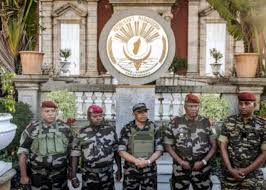News Flash

ANTANANARIVO, Madagascar, Oct 16, 2025 (BSS/AFP) - Colonel Michael Randrianirina had already become the face of Madagascar's military mutiny when he stood in uniform outside the presidential palace on Tuesday and told AFP the army had "taken power".
The 51-year-old commander with a history of opposing President Andry Rajoelina stepped into the limelight Saturday as leader of the mutinied CAPSAT contingent, declaring in a video statement they would "refuse orders to shoot" on anti-government demonstrators.
It was a turning point in a youth-led uprising that started on September 25: Rajoelina fled the country that weekend, impeached days later for desertion of duty.
The clean-cut Randrianirina, due to be sworn in as president on Friday by the country's top court, has pledged to lead the impoverished Indian Ocean island through a transition to civilian leadership that he said would take under two years.
- Arrest on coup claims -
A former governor of the southern Androy district, Randrianirina was arrested in November 2023 on accusations of plotting a coup shortly before contested elections that returned Rajoelina to power.
The arrest was reportedly ordered by General Richard Ravalomanana, a Rajoelina ally and former president of the Senate, whose dismissal on Sunday had been among the demands of a weeks-long protest movement.
Placed under house arrest with his alleged accomplice, Thierry Rampanarivo, and held in a military hospital, Randrianirina was sentenced in early 2024 to a one-year suspended prison sentence for "undermining national security".
"We left at the beginning of February (2024) and resumed our status as officers in the shadows," Randrianirina told AFP on Saturday.
"I had no duties," he said. "I worked at home, I cooked, I played football."
When Randrianirina and other CAPSAT soldiers broke ranks to denounce the violent crackdown on more than two weeks of youth-led protests, joining thousands marching in Antananarivo at the weekend, he became the military face of the movement that ultimately forced Rajoelina's departure.
"His courageous stance... and his image as a man of faith from the Lutheran Church reinforced his legitimacy," said analyst and researcher Velomahanina Razakamaharavo.
"In this context, the army was perceived as the last bastion against violence -- the institution capable of stopping repression and restoring order," she said.
- 2009 CAPSAT mutiny -
The CAPSAT contingent -- an army division primarily responsible for administration, personnel and logistics -- also carries symbolic weight, having played a central role in the 2009 coup that first brought Rajoelina to power.
In March 2009, soldiers stationed at the base in the Soanierana district, about six kilometres (four miles) from central Antananarivo, mutinied to protest then-president Marc Ravalomanana's crackdown on a three-month opposition movement.
"The mutiny, led by colonels Charles Andrianasoavina and Lylison René de Rolland, upset the balance of power and led to Rajoelina's seizure of power," said Razakamaharavo.
Rolland -- also accused of "undermining national security" in 2017 -- stood alongside Randrianirina Saturday when the CAPSAT once again mutinied.
"While CAPSAT's past remains controversial -- heroic to some, criticised by others -- it is now seen as a central player in the 2025 movement," Razakamaharavo told AFP.
Ahead of his inauguration Friday, Randrianirina pledged elections in 18 to 24 months and said the transition would include the restructuring of major institutions.
He insisted there had been no coup. "A coup is when soldiers enter the presidential palace with weapons, they shoot, there is bloodshed," he told reporters Thursday.
"We are in a process that follows the legal process. We are now going to work hard and very quickly to not disappoint the people," he said.
"This is a crucial moment for the armed forces," said Razakamaharavo.
It is "an opportunity to act as the 'last bastion' in favour of fairness and national renewal, ensuring that all voices are heard -- those of the younger generations, the opposition, and citizens in regions far from Antananarivo," the analyst said.